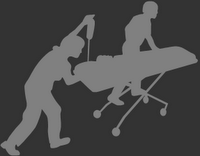 This month, I have had a few patient experiences. Already? Aren't you in your first month of school as a med student?!? They already have you seeing people?!? Yep. That's right. Skills that I thought I had, like interviewing people and learning more about them, counseling on problems and encouraging behavioral changes... I see all of these things in a new light now. Being a good doctor is hard work!
This month, I have had a few patient experiences. Already? Aren't you in your first month of school as a med student?!? They already have you seeing people?!? Yep. That's right. Skills that I thought I had, like interviewing people and learning more about them, counseling on problems and encouraging behavioral changes... I see all of these things in a new light now. Being a good doctor is hard work!Last week, I had a simulated patient experience that did not go as well as I would have liked. I was put into a small group with a "teenage patient who had just been drinking and driving in a car accident" (played by a MS-2 student) and we had to use HEADSSS to direct our questions and learn more about her. Unfortunately, the actress was playing the part right from the script -- I felt as though she was firmly sticking to the limited information she was given and didn't want to improvise any real answers with our genuine, conversational questions. The HEADSSS acronym proved useful in insuring that we covered all of the appropriate topics, but it did not generate any information from our patient other than "Yeah," "No," or "I dunno." We were getting frustrated towards the end because nothing we did really brought her out of her hostile bubble. Perhaps that was the whole point of the experience (though others in our class had different ones,) because the MS-2 came back into the room, reviewed what we had talked about and offered this advice: "Well, you could have invited her back for another appointment if there is anything she wants to talk about." As one of my group members put it: "There was no way we could have won that scenario." I think he took it especially hard because he had the counseling portion on responsibility, drinking and life goals.
On Tuesday, I had my first clinical skills experience. A group of us carpooled with Our Selected Preceptor out to a local rural hospital and we went over some of the components of the "chief complaint" and the "history of present illness," two parts of the patient write-up that doctors do. I took a few notes and then we were shuttled off to different hospital rooms to see our first patients!
I was in a group of three and I was assigned the role of History-taker. We chitchatted with Mrs L. for a while to find out why she was in the hospital and I was happy that the OLD CARTS mnemonic came in handy for the chief complaint. She had a fever and severe lower abdominal pain that prompted her to seek medical attention. She talked about her work in a restaurant, the stress involved, her kids and all that good stuff. I wrapped up my section with a good feeling about the experience. She was being transferred out of the Intensive Care Unit because her condition had improved significantly during the week that she was in the hospital. Two of my other classmates performed the vitals and examined her head, eyes, ears, nose, throat, lungs and heart. I was happy that they did it because I didn't really review the components of the physical exam beforehand and I was afraid that I might have missed something.
As it turned out, I missed a lot. Most of the information that a doctor picks up doesn't come from the physical exam; it comes from the patient's unwitting self-exam and history. On the ride back to school, Our Preceptor wanted a mini-report on Mrs. L. I botched the order of presentation, not really realizing the importance of standardizing the report for the listener (as opposed to sharing things in the order that they came up during the interview.) All of my questions were good ones... but I didn't follow up with the right sort of questions.
"So she had a left lower quadrant pain... what is located there?" asked Our Preceptor.
We outlined the various organs located there: her ovaries, her ureters, kidney, large intestine, etc.
"Did you ask about her stool? Was it red or black? Was she constipated? Did she have diarrhea?"
"Ah.... no. Well, I only asked her about the diarrhea, actually."
"What about her urination? Was she having trouble? Did it hurt when she went to the bathroom? Did she have to go often?"
"No, that didn't come up either. She mentioned that her pain worsened when she coughed..."
"She had a recent surgery. Did you ask her about it?"
"Well... I thought that the surgery actually happened after she was admitted to the hospital and we weren't supposed to find out her intervening treatments as a part of this exercise."
The questioning wasn't as brutal as I make it out to be, but I did realize how much of an art it is to properly interview a patient. They aren't going to offer all of the appropriate data freely, sometimes they need prompting, sometimes they might not have even noticed it themselves until you bring it up. It is certainly difficult to try and be an expert when we haven't even covered abdominal problems in our case studies yet... but I'm trying my best.
I'll be reviewing the physical exam sequence and proper medical record documentation so I can be more prepared in the upcoming weeks.





No comments:
Post a Comment